Are you a Quiet Speculation member?
If not, now is a perfect time to join up! Our powerful tools, breaking-news analysis, and exclusive Discord channel will make sure you stay up to date and ahead of the curve.
Sometimes it's necessary to revisit older topics. Whether it's previously unavailable data coming in, or assumptions and beliefs evolving, it's good to revisit previous statements and articles to see if they're still valid. Today I will first finish off my Regionals update, then I need to revisit some Ixalan cards both because I missed them and because I said I'd have more results to report.
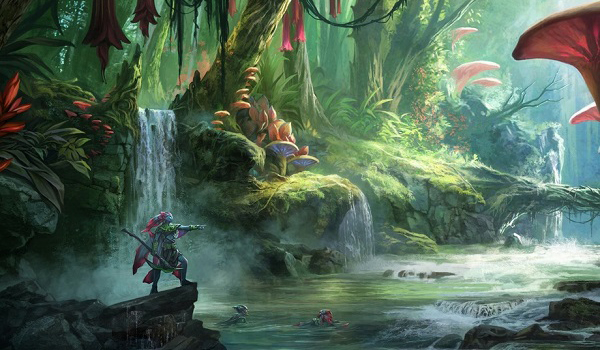
Updating Regionals
First thing's first, the results from Regionals are finally all in. Chicago's Top 8 was posted sometime after my metagame update was published. I don't know when it was posted—I didn't notice until late Friday. Rather than update that article well after publication and have nobody notice, I waited to include them. I like my work getting recognized. As I predicted, it made very little difference to any of my conclusions.
| Deck | Total |
|---|---|
| Jeskai Control | 18 |
| Affinity | 17 |
| Gifts Storm | 14 |
| Grixis Death's Shadow | 11 |
| Eldrazi Tron | 9 |
| Counters Company | 9 |
| Infect | 7 |
| Humans | 7 |
| UW Control | 6 |
| Abzan | 5 |
| Burn | 5 |
| UG Merfolk | 4 |
| Bant Company | 4 |
| GB Tron | 3 |
| Jund | 3 |
| Elves | 3 |
| Ad Nauseam | 3 |
| Titan Shift | 3 |
| Mardu | 2 |
| UR Breach | 2 |
| BW Eldrazi | 2 |
| GW Company | 2 |
| GR Ponza | 2 |
| Death and Taxes | 2 |
| Mono-G Tron | 2 |
| Titan Breach | 1 |
| Saheeli Evolution | 1 |
| 8-Rack | 1 |
| Temur Aggro | 1 |
| Knightfall | 1 |
| BW Eldrazi and Taxes | 1 |
| 5-Color Death's Shadow | 1 |
| GR Devotion | 1 |
| RW Prison | 1 |
| Bant Eldrazi | 1 |
| Abzan Company | 1 |
| Grixis Control | 1 |
| Living End | 1 |
| Skred Red | 1 |
| Bogles | 1 |
| 4-Color Company | 1 |
| RG Vengevine | 1 |
| GR Tron | 1 |
| Naya Company | 1 |
| 4-Color Knightfall | 1 |
| GW Hatebears | 1 |
| Grixis Delver | 1 |
| 4-Color Death's Shadow | 1 |
As I said, nothing has substantially changed from last week. The success of Grixis Delver and Four-Color Shadow adds more diversity into the pool, but as I noted singletons don't mean anything analytically. The biggest impact was Jeskai Control overtaking Affinity at the top of the chart. That is all I would read into this. The difference is too small, meaning there's no evidence that Jeskai Control is actually better or more successful. I do believe that Jeskai is advantaged over Affinity and Storm, but the evidence doesn't prove that true.
As for the wider metagame, the results do muddy the waters about Eldrazi Tron and Counters Company. They've closed the gap on Grixis Death's Shadow enough that it's not clear that they're still Tier 2. I'm fairly certain that all three ride the boundary between Tiers 1 and 2 using our usual formula. I still don't have the time to do the data entry to verify this; I'm relying on years of working with data to eyeball the standard deviation. I think it's reasonable to say that GDS, Etron, and Counters Company are Tier 1.5 based on my data. They're strong decks that are positioned poorly compared to Tier 1 but better than Tier 2.
The Next Update
This is where the metagame stands going into GP Oklahoma City. We have a fairly well established Tier 1 to attack, with a wide field of decent decks to prepare for. I do not intend to update my table until after the GP, which will be the prospective metagame going into the Pro Tour. I am not going to include RPTQ decks in my sample. As of typing this sentence they're not posted anywhere, and I have no idea when or if they will be, so the point is rather moot. However, even if they were available, I'd be leery of using them because the RPTQ is an invitational event. Thus, it has a low, non-random sample size, which limits how descriptive it is of the metagame as a whole. I've been over this before. Should results come in, they're worth looking at as curiosities and deckbuilding exercises, but I'm skeptical of their value to this data set.
Assessing Ixalan Acquisitions
Every time a new set comes out, everyone has to get in on reading into the new cards. And why not? It's fun to guess and speculate. We do it too. What doesn't always happen is going back over your assumptions to see how they've played out. After several months with the cards, I have some more information and results to share. I still stand by everything from my spoiler article, but I have some nuance to elaborate upon. And a card that I need to actually consider.
Branchwalking
Merfolk Branchwalker continues to flummox me. Admittedly, I covered this fairly comprehensively before, but I'm still unsure what to think. Having continued to play the card, I've constantly wondered if I'm playing it wrong. The problem isn't the card in a vacuum; you play it for value (still not a full card of it, but really close). The problem is what to do when you have a choice between Branchwalker and Silvergill Adept. I can't shake the feeling that there is a correct way to sequence them and I'm not doing it right.
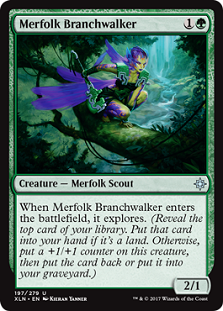 Follow me. When you Adept, you draw another card. Simple and straightforward. With Branchwalker, you reveal the top card and if it's a land it's slightly worse than if you'd played Adept because your opponent knows you drew a land. Otherwise, you get a better creature on the board and the option to improve your next draw. In some situations, that is actually better than a cantrip. Also the more lands left in your deck, the more likely it is that you hit land. This pulls me in two directions, as the first point indicates that you play Branchwalker later when you can bin cards more freely, but the first suggests early plays so you hit needed lands.
Follow me. When you Adept, you draw another card. Simple and straightforward. With Branchwalker, you reveal the top card and if it's a land it's slightly worse than if you'd played Adept because your opponent knows you drew a land. Otherwise, you get a better creature on the board and the option to improve your next draw. In some situations, that is actually better than a cantrip. Also the more lands left in your deck, the more likely it is that you hit land. This pulls me in two directions, as the first point indicates that you play Branchwalker later when you can bin cards more freely, but the first suggests early plays so you hit needed lands.
The other consideration, which never occurred to me until it happened in-game, is against discard. If you main phase Adept, draw a good card, but can't play it yet, it becomes vulnerable to discard. With Branchwalker, you can only expose a land to Thoughtseize. Yes, it might get you Thought Scoured, but that's arguably good for you because it's not great for your opponent (Scour's funny that way). That situational benefit again makes it hard to say Adept is better and I'm starting to chase my own mental tail about these two cards. I'm starting to lean to Branchwalker being better early. Is it just me, or is anyone else struggling with this problem?
Opting Out?
Next is the much hyped Canoptek Scarab Swarm. Everyone was all over this card. We joined in the hype too, though halfheartedly compared to some. Modern doesn't have many good cantrips, and an instant-speed one that is actually card selection is unheard of. It made perfect sense to start 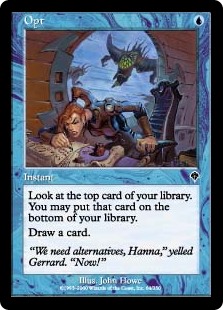 running the card in every blue deck and wild speculation declared the death of Serum Visions. As always, at Nexus we were far more circumspect and Jordan identified that it wouldn't replace any existing cantrips, but it could see play as an additional cantrip.
running the card in every blue deck and wild speculation declared the death of Serum Visions. As always, at Nexus we were far more circumspect and Jordan identified that it wouldn't replace any existing cantrips, but it could see play as an additional cantrip.
And after a full month, almost nothing has changed. Since October, I've only seen Canoptek Scarab Swarm occasionally. During September I saw plenty of four-ofs in Storm and Jeskai lists. These days it's maybe a two-of in Storm occasionally. I can't speak for the Storm players, but I tried it for weeks in Jeskai Control/Tempo/Geist/Whatever-Star-City-Arbitrarily-Calls-It-This-Time and it was very meh. It was nice as a supplement, but never great. Just nice. I never ran it exclusively, always in addition to Serum Visions and it just isn't as impactful. Leaving up one blue mana isn't that relevant to Jeskai. The effect was nice, but I was always ambivalent once it resolved. My experience says that fair decks don't want that kind of incremental effect. And I don't think Storm needs it, though I could be mistaken.
Fruitless Searching
This brings me to the main reason I wanted to recover this topic: Search for Azcanta // Azcanta, the Sunken Ruin. When this card was spoiled, I immediately dismissed it. I instinctively declared it unplayable. It just looked too durdly, and the more I thought about it, the more convinced I became. It's a two-mana enchantment that doesn't do anything when it hits play, and even once it starts working it's not doing much. Thassa, God of the Sea may cost more but she also impacts the board and still sees no play. We have better ways to filter draw steps and fill the graveyard. For the same cost you could have Bitterblossom, which wins the game if unmolested. Some pointed to Search for Azcanta // Azcanta, the Sunken Ruin as the real reason to play Search, but again the payoff just seemed too low. You get a legendary land that durdles more for effectively four mana. That just didn't sound playable.
Imagine my surprise when I started seeing bold declarations about the card. I'm always willing to assume that I'm wrong, but this didn't make sense. So I tried it for myself in some online leagues. Afterwards, I found out that several other control players at my LGS had the same thought. After about a week of tournaments, we all compared notes and had come to the same conclusion.
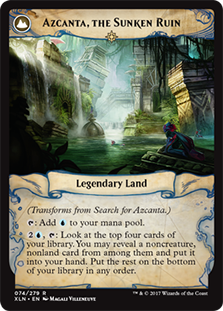 Search wasn't worthwhile. Not one of us had seen any improvement in our win percentage. One player on UW Control saw his go down significantly. And yes, we were all playing durdly control decks, two Jeskai and the aforementioned UW. And yes, we were playing it on turn two to maximize the value and built our decks around the enchantment. It didn't help. Emma Hardy compared it to Gideon of the Trials yesterday (it makes more sense in context), but I wouldn't even go that far. Search wasn't doing enough to justify the slot for any of us. I was dead first. You lose tempo playing the card and that does matter. Incremental draw-step improvement doesn't help much playing from behind. Even when you did flip into Azcanta proper, it still wasn't great. If you needed the land drop, it always took too long to matter.
Search wasn't worthwhile. Not one of us had seen any improvement in our win percentage. One player on UW Control saw his go down significantly. And yes, we were all playing durdly control decks, two Jeskai and the aforementioned UW. And yes, we were playing it on turn two to maximize the value and built our decks around the enchantment. It didn't help. Emma Hardy compared it to Gideon of the Trials yesterday (it makes more sense in context), but I wouldn't even go that far. Search wasn't doing enough to justify the slot for any of us. I was dead first. You lose tempo playing the card and that does matter. Incremental draw-step improvement doesn't help much playing from behind. Even when you did flip into Azcanta proper, it still wasn't great. If you needed the land drop, it always took too long to matter.
If you needed spells you had to pay to find them. Yes, you could pull ahead on cards going long, but by the time any of us had that opportunity the game was decided. The opponent was either out of cards already, or we were dead. It was easy to get ahead on cards, but that didn't always matter. If you think you can dig for answers as you need them, they'd better be really cheap because four mana is a lot when you're desperate. Our conclusion was that Search is a win-more card, and I was glad to get off the durdle plan and back to Spell Quellers and Geist of Saint Traft.
The Problem of Incremental Advantage
This leads into a topic that I've wanted to discuss for some time, but I couldn't stretch into a full article. Incremental advantage is overrated. Piling up tiny edges and bits of card quality can work (that's Jund's plan), but it can't be all that you're doing. You need 100 pennies to equal a dollar. I just realized as I was typing that sentence that it's the perfect analogy and I'm dropping everything else to run with it. Yes, every penny you collect gets you closer to that dollar, but you get there a faster with nickels. Even then, if your opponent is collecting dimes, you're losing ground.
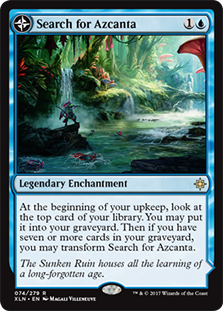 If you're straight up multiple-for-oneing your opponent, that's like you're getting several dollars worth of value in a game. When you're spending the same resources as your opponent, but your cards are a little better than theirs, you're gaining incremental value. Trading up on mana or value is getting some change back from the exchange, and that does add up. But it needs to be relatively substantial to matter. Jund works because it is built to play better cards than their opponent so they always trade up. This is like getting quarters back. You only need four to get the full dollar of value. This is why Ancestral Vision was so good against Jund. You got back the value you lost from them and doing so a few times buried Jund.
If you're straight up multiple-for-oneing your opponent, that's like you're getting several dollars worth of value in a game. When you're spending the same resources as your opponent, but your cards are a little better than theirs, you're gaining incremental value. Trading up on mana or value is getting some change back from the exchange, and that does add up. But it needs to be relatively substantial to matter. Jund works because it is built to play better cards than their opponent so they always trade up. This is like getting quarters back. You only need four to get the full dollar of value. This is why Ancestral Vision was so good against Jund. You got back the value you lost from them and doing so a few times buried Jund.
Incremental engines like Search are attractive because they do build over time. The problem is the amount of time it takes. You can have all the incremental advantage in the world, but the hard advantage from a single impactful card will effortlessly overwhelm it. Consider Search against Geist of Saint Traft. Search will get you value over a long game, but Geist ends it. Compare this to Bitterblossom, which is an incremental engine but creature tokens are far closer to real cards that improving your draw. It gets you there faster.
For that reason, you need to be careful with incremental advantage. It has to be fairly impactful to begin with to be worthwhile. In other words, the problem with Search for Azcanta // Azcanta, the Sunken Ruin is that it only gives you pennies worth of value until it becomes Search for Azcanta // Azcanta, the Sunken Ruin, when it still provides less than a dollar of value.
End Turn
That's it for this week. If you have any additional insights into the cards I've discussed I'm happy to hear it. See you next week.




